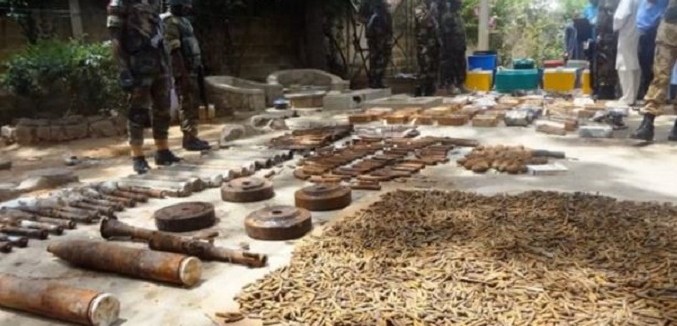Nigerian authorities have broken up what is believed to be a Hezbollah terror cell that was operating in the country.Three Lebanese nationals were arrested and allegedly confessed to being members of the Iran-backed terror group, and a fourth operative is thought to have escaped the country. Authorities also seized a Hezbollah-linked weapons cache in the northern city of Kano that included rifles, anti-tank weapons, and an RPG. They were to be used against Israeli and Western targets:
Nigeria’s State Security Service said they were intended for use against “Israeli and Western interests”. “This is the handwork of Hezbollah,” Bassey Ettang, director of the State Security Service in Kano said. “What has just been discovered is a cell of Hezbollah and what you have seen here is a Hezbollah armoury,” he told journalists in Kano on Thursday. Brig Gen Ilyasu Isa Abba said 11 anti-tank weapons, four anti-tank mines, a rocket-propelled grenade (RPG) and 21 RPG missiles, 17 AK-47s, two sub-machine guns and 76 grenades had been amongst the weapons found.
Last February Nigerian authorities announced the arrest of a different Iran-backed terror cell made up of three Nigerians.
Meanwhile, Bahrain is set to ask members of the Gulf Cooperation Council (GCC) to formally designate Hezbollah a terror organization. Manama blacklisted the group last month after years of Hezbollah activity inside Bahrain’s borders. The Bahrainis will ask Gulf allies to follow suit:
Bahrain will ask the six countries in the Gulf Cooperation Council (GCC) to consider placing Hezbollah on their terrorism list at a meeting in Jeddah, Saudi Arabia, on Sunday. The Arab Gulf states have long been wary of Iranian influence in the region, and have accused Tehran of spying and meddling in internal politics. Iran’s activities in the GCC countries will also be on Sunday’s agenda, at Bahrain’s request, the Kuwaiti daily Alrai reported Thursday. The GCC consists of the Arab states Bahrain, Kuwait, Oman, Qatar, Saudi Arabia, and the United Arab Emirates.
Bahrain’s request will call on Gulf States – which have become increasingly vehement in criticizing Hezbollah’s global activities – to outright designate the group as a terrorist entity. In contrast to counter-terror efforts inside the European Union, but in line with expert evaluations and statements by Hezbollah officials themselves, the GCC is not expected to draw a distinction between Hezbollah’s military and political wings.
[Photo: VideoNewsPortal / Youtube]




